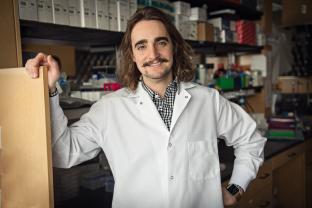Biography
Costas Lyssiotis obtained his bachelor’s degree in Chemistry and Biochemistry from the University of Michigan in 2004, his PhD in Chemical Biology from The Scripps Research Institute in 2010, and then completed postdoctoral training in the laboratory of Lewis Cantley at Harvard and Cornell. In 2015, Dr. Lyssiotis joined the faculty at the University of Michigan with appointments in the Departments of Physiology and Medicine. Dr. Lyssiotis leads the Tumor & Immune Metabolism program and is the co-Director of the Pancreatic Disease Initiative at Michigan Medicine.
Dr. Lyssiotis is passionate about science education and training the future generation of scientists. He is an active lecturer and participant in graduate education. Additionally, he leads a large and highly diverse research lab that studies the biochemical pathways and metabolic requirements that enable tumor survival and growth. This work spans the areas of cancer metabolism, the tumor microenvironment, and immunometabolism using and developing protocols in mass spectrometry-based metabolomics. Ultimately, his group aims to transition new information about these processes into targeted therapies for cancer and other diseases.
Dr. Lyssiotis has published >100 peer reviewed research papers and was recognized as a highly cited researcher (top 1% across sciences) by Web of Science. He was also recognized as a Next Generation Cancer Scientist by Trends in Cancer Biology, and he has been the recipient of several junior scholar awards including being named a Lefkofsky Scholar, Kimmel Scholar, AACR NextGen young investigator, Damon Runyon Dale F. Frey Breakthrough Scientist, and V Foundation Fellow.
Research Interests
The growth of a tumor, just like the growth of a cell or an organism, requires nutrients and a means to convert nutrients into energy and the basic building blocks that support life. These metabolic processes are frequently deregulated in cancer cells to facilitate growth and enable survival. The Lyssiotis laboratory uses a multi-disciplinary approach encompassing methods in chemistry and biology to define how metabolism is rewired in cancer and then to employ this understanding in the design of targeted tumor metabolism-based therapies.
Research Opportunities for Rotating Students
Publications
Kerk SA, Lin L, Myers A, Chen B, Sajjakulnukit P, Robinson A, Thurston G, Nelson BS, Kemp S, Steele NG, Hoffman M, Wen H, Ramos J, Gao T, Zhang L, Lombard DB, Halbrook CJ, Crawford HC, Pasca di Magliano M, Shah YM, Lyssiotis CA. The pancreatic tumor microenvironment buffers redox imbalance in cancer cells following disruption of mitochondrial metabolism. bioRxiv (in revision).
Halbrook CJ, Pontious C, Lee H-J, Kovalenko I, Zhang Y, Lapienyte L, Dreyer S, Kremer DL, Zhang L, Sajjakulnukit P, Zhang L, Nelson B, Hong H, Kemp S, Chang D, Biankin A, Crawford HC, Morton JP, Pasca di Magliano M, Lyssiotis CA. Macrophage Released Pyrimidines Inhibit Gemcitabine Therapy in Pancreatic Cancer. Cell Metabolism, 2019;29:1390-1399.
Sousa CM, Biancur DE, Wang X, Halbrook CJ, Sherman MH, Zhang L, Kremer D, Hwang RF, Witkiewicz AK, Ying H, Asara JM, Evans RM, Cantley LC, †Lyssiotis CA [†co-senior authors], †Kimmelman AC. Pancreatic Stellate Cells Support Tumor Metabolism Through Autophagic Alanine Secretion. Nature 2016;536:479–483.
Badgley MA, Kremer DM, Maurer HC, DelGiorno KE, Lee H-J, Purohit V, Sagalovskiy I, Firl CEM, Sastra SA, Palermo CF, Kapillian J, Decker A, Ma A, Sajjakulnukit P, Zhang L, Tolstyka ZP, Cerf TH, Liu T, Gu W, Seeley ES, Stone E, Georgiou G, Luga A, Wahl GM, Stockwell BR, Lyssiotis CA, Olive KP. Science, 2020;368:85-89.
Voss K, Hong H, Bader JE, Sugiura A, Lyssiotis CA, Rathmell JC. A How-to Guide for Immunometabolism. Nature Reviews Immunology, 2021, ePub ahead of print.


